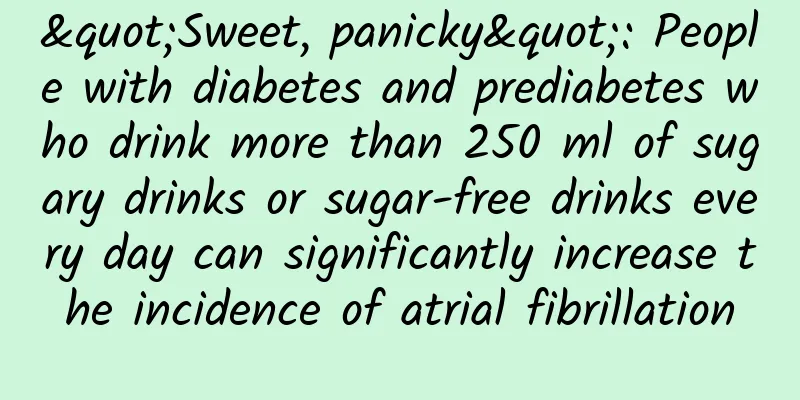"Sweet, panicky": People with diabetes and prediabetes who drink more than 250 ml of sugary drinks or sugar-free drinks every day can significantly increase the incidence of atrial fibrillation

|
Diabetes is an independent risk factor for atrial fibrillation and may increase the risk of atrial fibrillation through multiple mechanisms, including coronary artery atherosclerosis, diabetic cardiomyopathy, cardiac dysfunction, myocardial fibrosis, oxidative stress and inflammation. Therefore, patients with diabetes should pay special attention to the risk of atrial fibrillation and take appropriate preventive measures. In recent years, the beverage industry has vigorously promoted artificial sweetener beverages (also known as sugar-free/low-sugar/sugar-substitute beverages) and natural fruit and vegetable juices (i.e., 100% pure fruit or vegetable juice) as substitutes for sugary beverages. Compared with the general population, patients with diabetes are generally more inclined to choose to drink low-sugar or sugar-free beverages. However, to date, it is unclear whether the intake of sugary beverages, artificial sweetener beverages, and natural fruit and vegetable juices is associated with the risk of atrial fibrillation in people with diabetes and prediabetes, and whether replacing sugary beverages with artificial sweetener beverages and natural fruit and vegetable juices can reduce the risk of atrial fibrillation. (The picture comes from the Internet, the copyright belongs to the original author) In response to this problem, the National Clinical Research Center for Kidney Diseases of Nanfang Hospital, Southern Medical University, has carried out relevant work, and the research results were recently published in the journal Diabetes, obesity and metabolism . Professor Qin Xianhui of the National Clinical Research Center for Kidney Diseases of Nanfang Hospital, Southern Medical University, is the corresponding author of the article , and Dr. Gan Xiaoqin is the first author. The study found that in people with diabetes and prediabetes, the intake of sugary drinks and artificial sweeteners significantly increased the risk of atrial fibrillation, while the intake of natural fruit and vegetable juice was not significantly associated with the risk of atrial fibrillation. Replacing the same amount of sugary drinks with natural fruit and vegetable juice can significantly reduce the risk of atrial fibrillation. The study included 31,433 participants with prediabetes and diabetes, with an average age of 59.1 years and 50.4% women. During the 12.0-year follow-up, a total of 2470 participants developed atrial fibrillation. Studies have shown (Figure 1) that the intake of sugary drinks (Figure 1A) and artificial sweetener drinks (Figure 1B) is positively correlated with the risk of new-onset atrial fibrillation. Drinking more than 250 ml of sugary drinks per day significantly increases the risk of new-onset atrial fibrillation by 30%; drinking more than 250 ml of artificial sweetener drinks per day significantly increases the risk of new-onset atrial fibrillation by 21%. Drinking natural fruit and vegetable juices is not significantly associated with the risk of atrial fibrillation (Figure 1C). Figure 1. Association of sugary drinks (A), artificially sweetened drinks (B), and natural fruit and vegetable juices (C) with the risk of atrial fibrillation In the substitution analysis, replacing 250 ml of sugary drinks per day with an equal amount of natural fruit and vegetable juice significantly reduced the risk of atrial fibrillation by 9%. However, when artificially sweetened drinks were used to replace sugary drinks, there was no significant difference in the risk of atrial fibrillation. (The picture comes from the Internet, the copyright belongs to the original author) The idea that sugary drinks are unhealthy has been deeply rooted in people's minds. Some current propaganda defines artificially sweetened drinks as sugar-free or low in sugar and calories, suggesting that they can be a healthy alternative to sugary drinks. However, this study shows that in people with diabetes and prediabetes, excessive intake of sugary drinks or artificially sweetened drinks can significantly increase the risk of atrial fibrillation, so the so-called "sugar-free" is not equivalent to health. For people with diabetes and prediabetes, this study suggests that consuming natural fruit and vegetable juices may be more appropriate. Knowledge Points Common sugar substitutes in food include: aspartame (also known as asparagus phenylalanine methyl ester), acesulfame potassium (also known as acesulfame potassium), asparagus phenylalanine methyl ester acesulfame acid, D-mannitol, erythritol, glycyrrhizinate (including ammonium glycyrrhizinate, monopotassium glycyrrhizinate, tripotassium glycyrrhizinate), mogroside, maltitol, maltitol liquid, xylitol, neotame, lactitol, sucralose (also known as sucralose), sorbitol, sorbitol liquid, thaumatin, saccharin sodium, stevioside, cyclamate (also known as sodium cyclohexylaminosulfonate), calcium cyclohexylaminosulfonate, isomaltulose, etc. (The picture comes from the Internet, the copyright belongs to the original author) References: Gan X, Ye Z, Zhang Y, He P, Liu M, Zhou C, Zhang Y , Yang S, Huang Y, Xiang H, Qin Editor | Gan Xiaoqin and Cai Xianglian Audit | Qin Xianhui |
Recommend
What is the normal size of a woman's ovarian follicle?
We all know that if a woman wants to get pregnant...
What injection should I take for less menstruation
The amount of menstrual flow in women is also an ...
Things to know when removing an IUD: What should women pay attention to when removing an IUD?
With the opening up of national policies, many co...
Can I eat crayfish during pregnancy?
Most women will avoid certain foods during pregna...
Diarrhea means bad food? The culprit may be these 7 things, don't take it lightly
Who doesn’t have diarrhea in the summer? What’s t...
What are the details about soy milk powder? Why does soy milk powder clump?
Soy milk is rich in nutrients, especially protein...
Applications and challenges of artificial intelligence in anesthesiology
With the rapid development of science and technol...
Drinking cold water can make you gain weight, you can find out the bacteria in your intestines
Author: Cui Yihui, registered dietitian, master o...
How to perform nipple repair?
The nipple is the interface for the baby to obtai...
Why is the leucorrhea yellow and smelly?
For female friends who have symptoms such as yell...
What is bleeding during menstruation?
Bleeding in the middle of menstruation. I believe...
What is the reason for pale menstrual blood?
When female friends have their menstrual period, ...
Causes and treatment of irregular menstruation
Irregular menstruation is a gynecological disease...
Can pregnant women eat lactulose?
Lactulose is a drug that has a good effect in rel...
What is the difference between signs of pregnancy and signs of menstruation?
In daily life, many women will experience more or...









